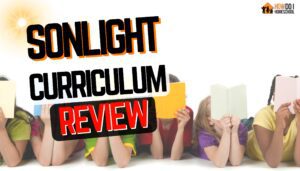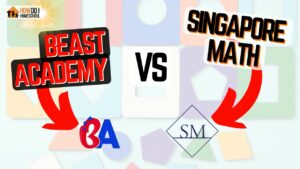The Vocal Gym For Homeschool is a singing curriculum that promises to transform aspiring singers into confident performers. With a focus on developing proper technique, building repertoire, and honing performance skills, this program offers a unique opportunity for homeschoolers to explore their passion for singing in a supportive and nurturing environment. In this review, we will take a closer look at The Vocal Gym For Homeschool’s singing curriculum and evaluate its effectiveness in helping students achieve their vocal goals.
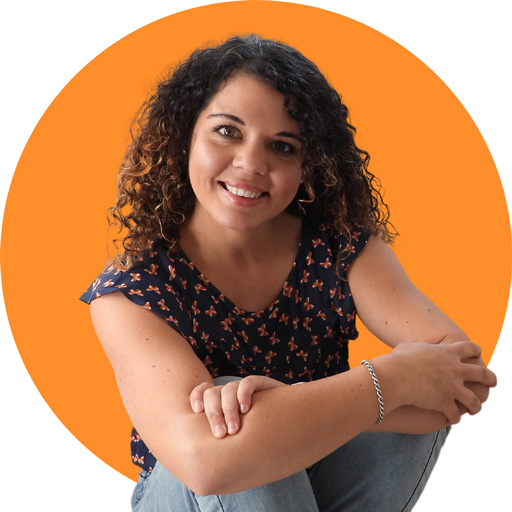
I hope you enjoy reading this blog post. If you want to do my course on how to homeschool, click here.
Affiliate links are used on this page.
The Vocal Gym For Homeschool Curriculum
The Vocal Gym’s homeschool singing curriculum is an online course that provides self-paced and interactive learning for high school students who are homeschooled and have a keen interest in singing.
The Vocal Gym uses a scientific approach to eliminate the mystery of singing while still celebrating the distinctiveness of each individual voice.
Throga’s homeschool singing curriculum offers:
- over 150 hours of lessons, vocal exercises, and activities per year,
- more than 300 educational videos to help students learn and improve their vocal technique and performance skills,
- hours of downloadable MP3s to practice with and enhance their vocal abilities,
- an impressive 115,000 vocal exercise combinations, providing students with ample opportunities to hone their skills and build their repertoire.
This makes Throga one of the most comprehensive singing curriculum programs on the market today!
What is Unique about this Singing Curriculum?
The method used for vocal development throughout the course is called Throga.
Throga uses the 7 Dimensions of Singing and is the only vocal technique in history to receive a full U.S. utility patent.
After students complete their vocal assessment (see below for the one I did!), the course provides a personalized learning experience tailored to help each student understand their strengths and weaknesses based on the 7 dimensions of the voice.
Another unique feature is that students can receive a full credit towards Fine Arts or Extracurricular activity because of how many hours that can be generated from learning and practicing at home through vocal training, assignments, quizzes, and activities.
Finally, for parents, the Vocal Gym platform is unique because it automatedly tracks all the time their child spends ACTIVELY working in the Vocal Gym, and graphically shows their overall vocal progress.
Plus it allows parents to monitor and download quiz results and written assignments in PDF form at any time.
Why Did the Vocal Gym Begin?
Richard Fink, a vocal coach of 25 years and father of two homeschooled daughters, noticed a gap in the homeschool curriculum space for singing and vocal training.
Recognizing the need for a comprehensive vocal education program for high school students, Fink collaborated with other experienced educators in May of 2020 to create Throga Vocal Gym.
After three years of development, filming, and testing, the Vocal Gym is now coming to the market, offering a much-needed solution for homeschooled students interested in developing their singing skills.
How Many Years Has This Program Been Running?
The Vocal Gym program has a rich history of development and evolution, with its original course having been launched in 2019.
In 2023, the program has undergone a complete redesign specifically for homeschoolers, making it a brand-new offering that represents the latest and most comprehensive approach to vocal education for high school students who are learning from home.
What Homeschooler Does this Particularly Suit?
The Vocal Gym For Homeschool’s singing curriculum is an excellent choice for any homeschooler interested in developing their vocal skills.
Also, the program is especially well-suited for neuro-divergent individuals with conditions such as autism, ADHD, OCD, and dyslexia. With a focus on providing rich visual and auditory content, the program offers multiple means of reinforced learning that have been shown to benefit individuals with these conditions.
Is the The Vocal Gym For Homeschool Aimed Toward Any Learning Styles?
Yes. It particularly helps the following types of learners:
- Visual – many aspiring singers struggle to connect with their voice because they can’t visualize it. Throga uses diagrams and video and color graphs to help the students connect with their voices and to remove the feeling of mystery which often leads to frustration.
- Aural – Throga Vocal Gym uses video to guide and a ton of mp3s to give students an auditory guide to practice their voice daily.
- Social – as the student’s voice develops over time, several of the activities in the course encourage singing in front of their parent or in public to gain more experience in communication and expression.
- Solitary– the vocal gym is a solitary experience when practicing (though keep in mind that teachers can help when needed). This solitary experience allows the user to take risks and feel unencumbered by potential judgment from others while they explore their singing. Mistakes, such as singing wrong notes and sounding “bad” temporarily, are essential in the process of learning and improving. This is hard to do around others with such a personal instrument!
- Verbal – The Throga Vocal Gym explains every part of the voice, how sound is created, and how each vocal exercise will help develop the student’s voice. By intricately understanding how the voice works, students will get more out of their practice.
- Logical – The Throga technique uses a logical and scientific-based approach to learning how to sing. The main curriculum follows suit with how it is laid out: every lesson must be completed before gaining access to the next one. The additional courses (the Pattern Vault, Beyond the Gym, and Glossary) require repetition and flexibility based on the student’s need. Therefore, it can be used out of sequence and are accessible at any time.
As you can see, the Throga Vocal Gym engages students with almost every learning style, making it an excellent curriculum for anyone!
What Sort of Format is This Curriculum?
Almost all of the curriculum (including lessons, quizzes, and activities) are online.
However, the Pattern Vault (included with the main course) offers hundreds of downloadable MP3s to practice with offline, and the assignments are available in optional PDF form in the Homeschool Toolbox (parent access).
Though not in a traditional, tactile form, The Vocal Gym has ‘vocal manipulatives’ throughout the entire course in the form of vocal exercises and singing to reinforce and develop muscular behaviors.
What Homeschool Method Does the Vocal Gym Follow Most Closely?
The course can be implemented well with the following:
- Classical
- Eclectic and
- Charlotte Mason methods.
However, the lessons and curriculum are modeled after US state standards for Artistic Processes and Blooms Taxonomies.
How Much Time Does a Parent Have to Spend in Hands-On Teaching?
Parents are encouraged to interact with their child’s development and some suggested activities within the course…but this is not required.
Throga understands parents get busy juggling core subjects and that some parents may not feel musically inclined or interested in the Fine Arts. Hence, they allow the child to develop and explore independently.
Additionally, some children, especially during puberty and voice changes, may feel more comfortable exploring the vocal exercises and assignments privately.
However, Throga provides all the tools necessary for the parents to assist with the learning process and be as involved as they wish.
The Homeschool Toolbox, included in the Parent Portal dashboard, offers video guides for the assignments, quiz keys, and additional activities for the parent to guide and learn along with their child.
Is There Automatic Marking?
Yes. There is:
- record-keeping,
- time training,
- progress reports,
- quiz results and
- activity responses
These are all tracked for you!
Parents are provided a private password to access the Parent Portal within their child’s account, which shows them everything they have completed, the percentage to completion (week and year goals), and the option to download and print PDF versions of all completed materials and overall progress from the time the child started the course.
Do Parents Need to Purchase Any Extras?
No. Fortunately, students come with vocal instruments in situ!
Also, a subscription comes with a downloadable copy of the 7 Dimensions of Singing book, which can be used as supplemental reading.
What Age Is the Vocal Gym Geared Toward?
The curriculum is geared towards 9th-12th grade but functional for more vocally experienced or advanced learners starting as young as 12.
Parent involvement is highly recommended for 7th-8th graders.
Is the Curriculum Flexible?
The curriculum is flexible in two key ways:
- As a self-paced elective or fine arts credit, the course does not have to follow traditional school hours or even a school year. Students can focus on their core subjects and explore singing in the summer months and weekends if they choose. This can be done over a single year or spread out over several years, based on the number of hours they aim for. The vocal exercises should be repeated often, the same as learning any other instrument, and can even be used to gain a full credit per each year of High School if desired.
- The exercises within the course are all customizable to fit the student’s needs. They use a “teach a man to fish” approach so that the student can learn to adapt and develop their voice based on how it responds to each exercise. Finding the appropriate difficulty in an exercise is essential for mindful practice. This allows a student to grow continually and not plateau after the first few weeks.
How Much Planning Do You Need to Do Before You Begin?
None!
The process starts with your child taking a self-evaluation as a baseline for understanding their current skills as a vocalist, and then they start the course.
That said, parents may need to plan out how much time their child should spend training each week to meet their curriculum/credit goals.
Is Any Part of This Curriculum Re-Usable?
The progress reports, assignments, and activities are only applicable to a single child, but they offer a significant discount to siblings who also enjoy singing!
What Support Does the Vocal Gym Offer?
In addition to general support, such as FAQ in the Help Center, students can post a question directly on every lesson page within the course.
These questions are answered by a Certified Throga Instructor (a vocal coach well-versed in the Throga Technique and the 7 Dimensions of Singing).
Parents can also post questions and comments in the Facebook Group, exclusive to Vocal Gym users. Students are never alone in the learning process and will receive personalized feedback on their questions.
How Much Does this Singing Homeschool Curriculum Cost?
The Vocal Gym For Homeschool is an annual subscription model, which is $349 per year, for a family’s first child (2023).
Additional children (siblings only) can then subscribe for $99 per year.
For parents exploring the performing arts for the first time, this price may cause some “sticker-shock”! But in reality, $349/year is incredibly cheap and affordable when compared to purchasing things like a guitar (plus amp, guitar case, chords, pedals, new strings every two months, etc.), plus private lessons!
Even in small rural areas of the United States, music lessons for guitar, piano, and singing start around $25/week for 30-minute sessions.
This equates to $1,300 per year and only counts for 26 hours of the 120 needed to earn a full credit. This leaves parents having to scramble for another 94 hours of activities and manually keep records.
Is This Curriculum Self-Paced?
Throga Vocal Gym’s homeschool singing curriculum is indeed self-paced, meaning students can work at their speed and according to their schedules.
This is particularly beneficial for homeschoolers, who often have a variety of other commitments and activities that they need to balance.
Does the Throga Vocal Gym Teach All Ages?
While Throga is quite flexible, it works best for Grades 7-12. This said the program is particularly geared towards 9-12th grade.
How Long Would it Take a Year 12 Student Per Day?
The amount of time each student puts in per day/week is flexible based on the goal set by their parents.
If they are aiming to complete 120 hours in a typical school-year, it will require an average of 4 hours per week for 30 weeks. Progress in vocal skills will be a natural by-product of the time being spent with the vocal exercises and lessons.
So every child will develop to some degree based on their musical intuitiveness, desire to improve, and coordination (skill) for singing.
Where Can I Purchase the Program?
On the Vocal Gym website here.
Does The Vocal Gym For Homeschool Have Any Christian Affiliation?
The Vocal Gym is not faith-based. However, they include recommended Christian artists, along with other genres, for students to choose from when exploring optional activities.
Parents also receive a list of recommended documentaries in the Homeschool Toolbox to watch with their child and encourage them to filter and only select the content that supports their family values.
Can I Get a Free Trial of This Singing Curriculum?
Although the curriculum itself does not have a free trial period, we offer a free vocal assessment to anyone curious about the course and to see how the 7 Dimensions of Singing works!
After completing the assessment, the student will discover their strengths and weaknesses as a vocalist and receive one free lesson (from the Vocal Gym Homeschool course) that specifically targets what they need to work on.
 Conclusion: Throga Vocal Gym
Conclusion: Throga Vocal Gym
Throga Vocal Gym’s homeschool singing curriculum is a fantastic option for homeschoolers exploring their passion for singing. With a rigorous focus on technique and performance, this program provides students the tools they need to become confident and skilled performers. The curriculum is well-designed and comprehensive, providing students with a solid foundation in vocal technique while also encouraging them to explore their creativity and individuality as artists. Overall, the Throga Vocal Gym’s homeschool singing curriculum is a great choice for homeschoolers looking to develop their vocal skills and achieve their singing goals.
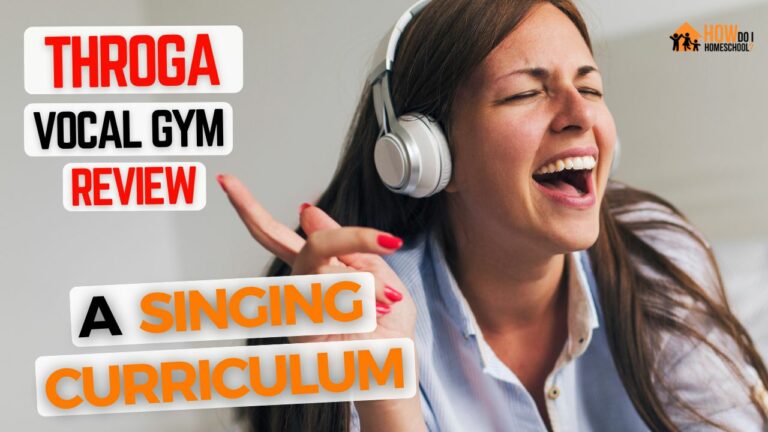
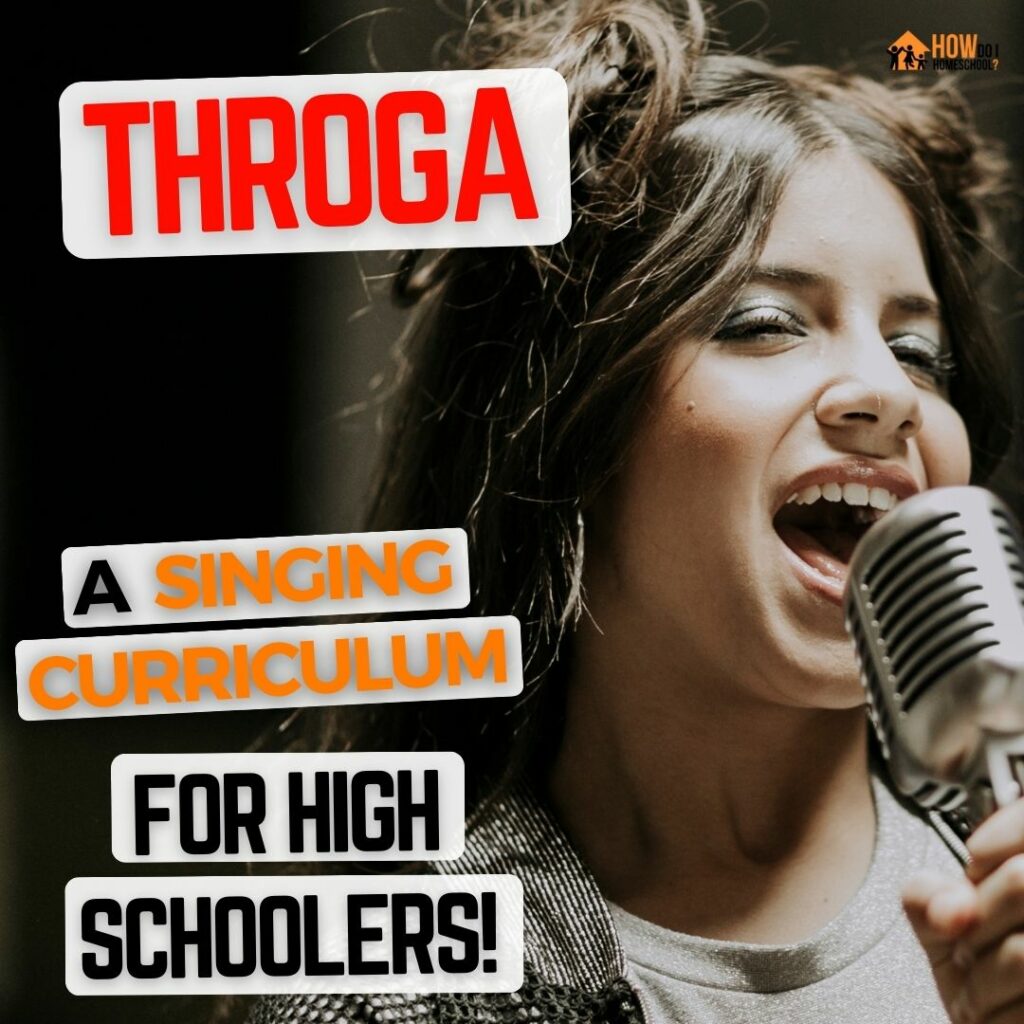
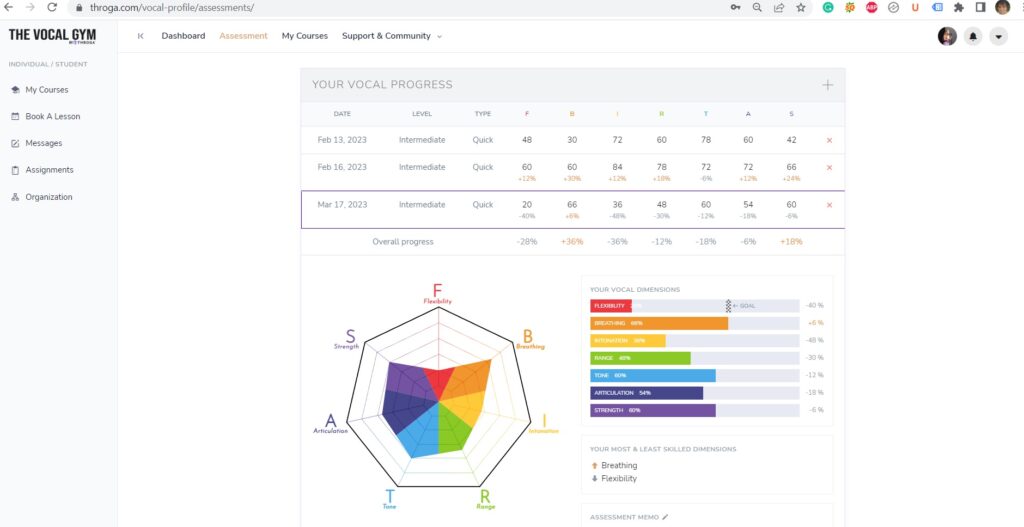
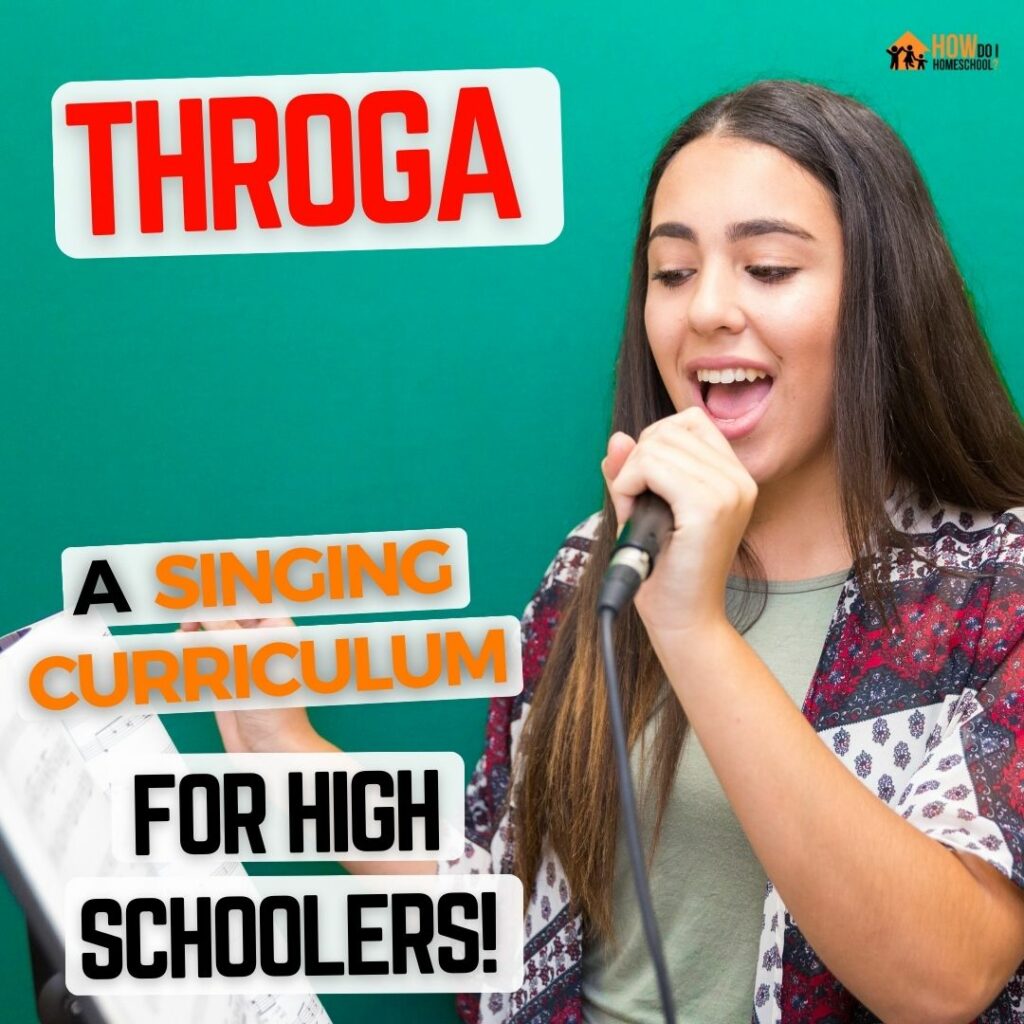
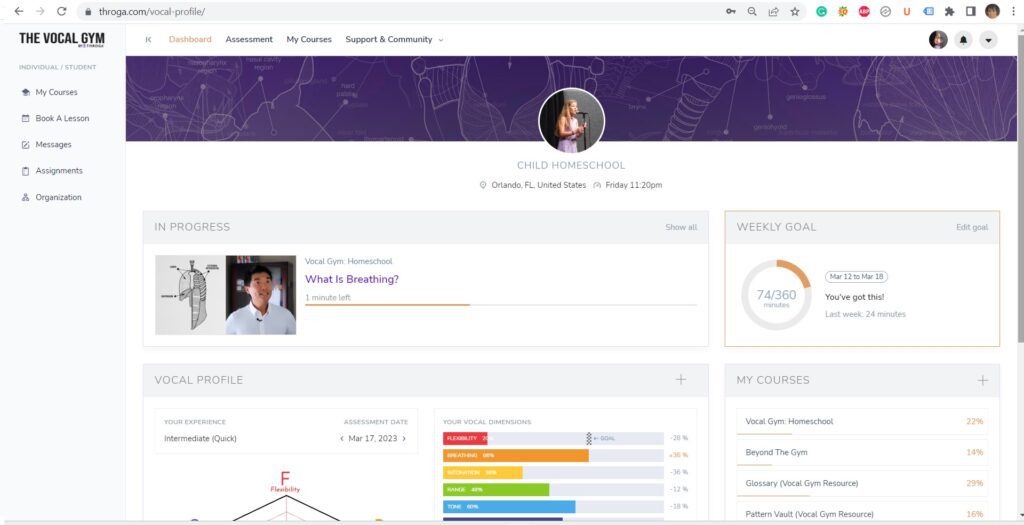
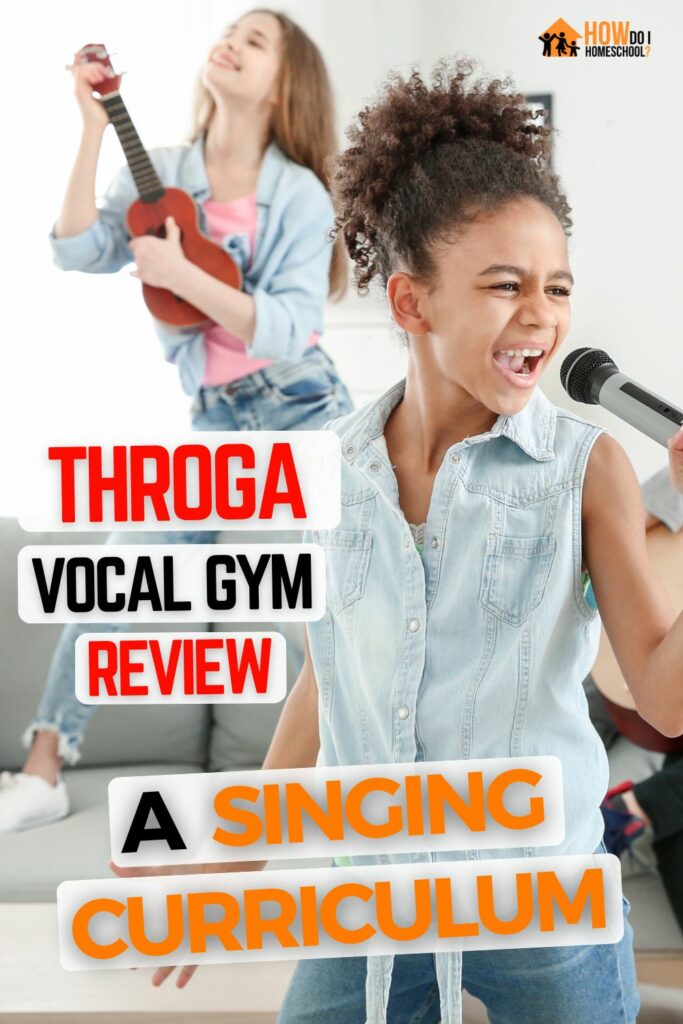 Conclusion: Throga Vocal Gym
Conclusion: Throga Vocal Gym
